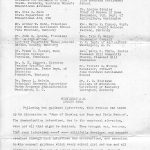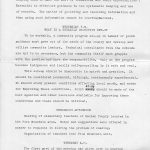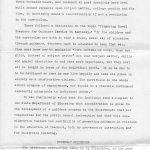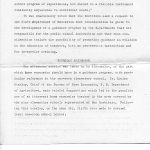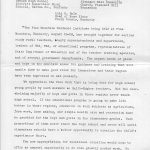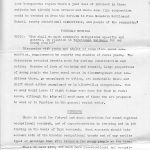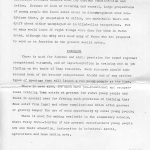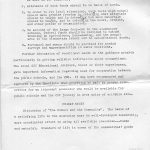Pine Mountain Settlement School
Series 13: EDUCATION
Rural Youth Guidance Institute
1937 Report
RURAL YOUTH GUIDANCE INSTITUTE 1937 Report
TAGS: Rural Youth Guidance Institute 1937 Report, educational training, youth guidance, Pine Mountain Settlement School, Glyn Morris, Everett K. Wilson, H.R.S. Benjamin, C. Latham Hatcher, Arthur Dodd, Bruce L. Melvin, R.E. Jaggers, Louise Stanley, U.S. Department of Agriculture, Iris C. Walker, Marie R. Turner
The Pine Mountain RURAL YOUTH GUIDANCE INSTITUTE 1937 was the annual week-long meeting of Harlan County teachers, parents, ministers and other youth leaders. It was held at the Pine Mountain Settlement School and coordinated by H.R.S. Benjamin, Director of the School. It brought back to campus two prior staff including the former Director, Glyn Morris and Everett K. Wilson, an teacher of civics in the early 1940s. The Alliance for Guidance of Rural Youth of Richmond, Virginia, sponsored the meeting.
GALLERY: RURAL YOUTH GUIDANCE INSTITUTE 1937 Report
BRIEF REPORT OF THE PINE MOUNTAIN RURAL YOUTH GUIDANCE INSTITUTE WITH FINDINGS by H.R.S. Benjamin (Notes)
- guidance_inst_benjamin_001
- guidance_inst_benjamin_002
- guidance_inst_benjamin_002a
- guidance_inst_benjamin_003
- guidance_inst_benjamin_003a
- guidance_inst_benjamin_004
- guidance_inst_benjamin_004a
- guidance_inst_benjamin_005
- guidance_inst_benjamin_005a
- guidance_inst_benjamin_006
- guidance_inst_benjamin_006a
- guidance_inst_benjamin_006b
- guidance_inst_benjamin_007
TRANSCRIPTION: RURAL YOUTH GUIDANCE INSTITUTE 1937 Report
BRIEF REPORT OF THE PINE MOUNTAIN RURAL YOUTH GUIDANCE INSTITUTE WITH FINDINGS
Consultants:
| Dr. O Latham Hatcher, President Alliance for Guidance of Rural Youth. Formerly, Southern Woman’s Educational Alliance |
Mr. Glyn Morris, Director Pine Mountain Settlement School |
| Mr. Otis C. Amis State Supervisor of Educational Aid, NYA |
Dr. Louise Stanley Chief of Bureau of Home Economics, U.S Dept. of Agriculture, Washington |
| Mr. Arthur Dodd, Principal Pine Mountain Settlement School Pine Mountain, Kentucky |
Mrs. Marie R. Turner, Supt. Breathitt County Schools Jackson, Kentucky |
| Mr. John O. Dotson, Principal Benham High School District Supervisor Rural Schools Harlan County, Kentucky |
Mrs. Iris C. Walker Consumer’s Council U.S. Dept. Of Agriculture Washington, D.C. |
| Dr. Frank C. Foster, Dean Tusculum College Tusculum, Tennessee |
Rev. Edwin C. White, Pastor Pleasant Hill Community Church, Pleasant HIll, Tennessee |
| Dr. R.E. Jaggars, Director Teacher Training and Certification State Dept. of Education Frankfort, Kentucky |
Mr. Everett K. Wilson Counselor, 1936-37 Pine Mountain Settlement School |
| Dr. Bruce L. Melvin Principal Research Supervisor Works Progress Administration Washington, D,C |
Mr. J.D. Williams College of Education University of Kentucky Lexington, Kentucky |
WEDNESDAY A.M.
AUGUST 25th
Following two guidance interviews, this session was taken up by a discussion on “Ways of Knowing our Boys and Girls Better”. The demonstration interviews, due to the unnatural situation were not all that might be desired. They brought out, however, that such interviews —-” —- skillfully developed and records obtained through such interviews and observations, are essential to the sequent guidance which every school girl and boy and all drifters among the out-of-school young people need. Friendly approach as little formality as possible, the ability to create a feeling of partnership with the person interviewed, at the same time that facts basically important for rendering assistance is secured and used effectively, constitute the essential art of …
pg. 2
setting their interest, ambitions, health, handicaps, recreations, economic status, temperaments and so on, is vitally essential for helping them to make the most of themselves and their opportunities”. Essential to effective guidance is the systematic keeping and use of records. The matter of gathering and recording information and then using such information cannot be over-emphasized.
WEDNESDAY P.M.
WHAT IS A WORKABLE COMMUNITY SET-UP
To be workable, a community program set-up in behalf of youth guidance must grow out of the needs of the county and develop and utilize community leaders. Technical consultants from the outside are apt to be necessary, but the community itself must grapple with the problem and have the responsibility. Only as the program becomes indigenous and locally self-propelling is it safe and real.
This set-up should be democratic in spirit and practice. It should be considered permanent, although, continuously experimental. It should study present conditions affecting local youth, and needs for improving those conditions. A joint study should be made of the best agencies and other resources available for improving these conditions and these should be utilized.
WEDNESDAY AFTERNOON
Meeting of elementary teachers of Harlan County located in the Pine Mountain area. Helps and suggestions were offered in answer to requests in solving the problem of reading
Organization of teachers into Pine Mountain unit.
THURSDAY A.M.
The first part of the morning was given over to hearing three brief reports on the effect of guidance on the curriculum or Annville Institute, Pine Mountain Settlement School and the Breathitt County School System, respectively. In each case there had been a considerable enrichment of offerings through flexibility provided by an individualized curriculum, the addition of practical courses, and dropping of non-essential courses. The reports showed that when guidance comes in it reveals the needs …
pg. 3
and capacities of individual boys and girls in relation to the demand of life. It insists that the curriculum be built around these revealed needs, and inasmuch as most curricula have been built around emphasis upon subject matter, college credits and the like, it inevitably means a reconstruction if not a revolution in the curriculum.
There followed a discussion on the topic “preparing Rural Teachers for Guidance Service in Kentucky.” “If the children and the curriculum are both to find a freer, newer way of education through guidance, teachers must be educated to open that way. They must know how to emphasize life instead of books, boys and girls, instead of subject matter — not that subject matter, skills and mental discipline do not have much importance, but they must all be taught in terms of the individual youth. It is he who is t be developed so that he may live happily and take his place in society as a constructive citizen. The curriculum is the whole school program of experiences and should be a flexible instrument constantly adjustable to individual needs.”
It was unanimously voted that the Institute sends a request to the State Department of Education that consideration be given to the development of a guidance program by the departments that are responsible for the public school instruction and that this consideration include the possibility of promoting guidance in relation to the education of teachers, both as pre-service instruction and for in-service training.
THURSDAY AFTERNOON
The afternoon session was taken up by discussion, of the part which home economics should have in a guidance program, with particular reference to the one-room elementary school. Dr. Louise Stanley, Chief of the Bureau of Home Economics, U.S. Department of Agriculture, made helpful suggestions which led to the possible use of an itinerant home economics teacher in the area covered by the nine elementary schools represented at the Institute. Following this session, on the same day, visits were made to several local one-room schoolhouses.
pg. 4
FINDINGS OF COMMITTEE ON ENRICHMENT OF ELEMENTARY SCHOOL OFFERINGS
| John O. Dotson, Principal Benham High School District Supervisor Rural Schools, Harlan Co., Kentucky |
Rev. Edwin C. White, Pastor Pleasant Hill Community Church, Pleasant HIll, Tennessee |
| Lula M. Hale Head of Home Place Perry County, Kentucky |
The Pine Mountain Guidance Institute being held at Pine Mountain, Kentucky, August 25-28, had brought together for serious study rural teachers, county superintendents and supervisors, leaders of WPA, NYA, of educational programs, representatives of State Department of Education and of the teacher training agencies, and of several government departments. The urgent needs of girls and boys in the mountain areas for guidance and training that will enable them to make good lives for themselves and their region have been impressed on all present.
We appreciate the fine work that is being done for high school young people by such workers as Smith-Hughes teachers. But the overwhelming majority of boys and girls in those regions never reach high school. If the educational program is going to make life better in these regions, education in such subjects as agriculture, farm work, homemaking, and simple health care and recreation must be provided for the boys and girls in the elementary grades. Vast proportions of them never reach the high school and never will until elementary schools have a better opportunity to vitalize the child’s experience there.
The new appropriation for vocational education would seem to offer an unusual opportunity to do this greatly needed work. We respectfully urge you to make plans to use some of these funds for vocational education in the rural elementary schools. This could undoubtedly be done by providing itinerant teachers in agriculture, home economics, mechanics, and such similar subjects. Each teacher would cover a certain circuit of schools, enlisting the cooperation of teachers and parents in a fine program of practical preparation for life for the boys and girls.
pg. 5
“To approach this matter from an experimental basis we would suggest that a group of eleven rural schools in the Pine Mountain area would be an ideal field in which to start. Here is a more or less homogeneous region where a good deal of interest in those subjects has already been aroused and where some fine cooperation could be counted on from the workers in Pine Mountain Settlement School, county educational authorities, and people of the community”
THURSDAY EVENING
TOPIC: “How shall we meet community obligations specific and general, in relation to Vocational Guidance for our young people?”
Discussion with youth and adults of respective rural communities, supplemented by reports and studies of rural youth. The discussion revealed a drastic need for serious consideration and action. Because of lack of training and counsel, large proportions of young people who leave rural areas in discouragement over conditions there, go unequipped to cities, are [not] marketable there and drift about either unemployed or in blind-alley occupations. Not so many would leave if right things were done for them in rural areas, although the city will need many of those who are prepared to work or to function in the general social order.
FINDINGS
There is a need for federal and state provision for sound regional occupational research, and of experimentation in training and in job finding on the basis of this research. Such research should take account both of the broader occupational trends and of any earlier types of openings that will launch a few young people at the time.
There is a need also for much more pre-vocational and occupational training than exists at present for rural young people and there is a special need for freeing such provision of training that does exist from legal and other complications which often prevent or greatly hamper the use of such opportunity by rural young people.
There is a need for making available in the elementary schools, where fully three-fourths of the present out-of-school young people now and their education, instruction in industrial skills, agriculture and homemaking arts.
REPORT OF THE COMMITTEE ON VOCATIONAL EDUCATION
| Mrs. Marie R. Turner, Supt. Breathitt County Schools Jackson, Kentucky |
Mr. Everett K. Wilson Counselor, 1936-37 Pine Mountain Settlement School |
| Mr. John O. Dotson, Principal Benham High School District Supervisor Rural Schools Harlan County, Kentucky |
R.M. Van Horne, Principal Breathitt High School |
On the basis of figures submitted to this Institute, the urban areas cannot support adequate importations of youth from rural areas and the mountain areas are very seriously over-crowded with them. In this dilemma, it seems desirable to increase rural opportunities for training in various skills, but rural areas themselves cannot provide money at all adequate for such training.
The Committee, therefore, recommends:
- Federal funds from the George -Dean and Smith-Hughes Act should be made available for equipment and materials as well as for salaries.
- Allotment of such funds should be on basis of needs.
- In order to fit local situations, such rural high school should have greater freedom in determining what materials should be taught and in determining how much materials should be taught, and in determining the hours, credits, and other points of organization,
- ON account of the large drop-out in the elementary schools, federal funds should be provided to extend training in agriculture, home-making, and the manual arts to the elementary school and to out-of-school youth,
- Personnel and money should be provided for needed surveys and experimentation in rural vocations.
Further discussion of vocational needs in the guidance program particularly in getting reliable information about occupations. The local CCC Educational Advisors, based on their experiences, gave important information regarding the need for cooperation between the public schools, and the CCC. It was here recommended and approved by the Institute that provision be made by proper authorities for an itinerant counselor who would be available for public schools and the CCC jointly in area units of suitable size.
FRIDAY NIGHT
Discussion of “The School and the Community”. The basis of a satisfying life in the mountains must be well-developed leadership, more coordinated effort in using all available resources — human and material. Standard of life in terms of the communities’ goods …
pg. 7
and their own enrichment of life must be sought in terms of health education, reasonable comforts, recreations, and avocations.
SATURDAY MORNING
This session was devoted to a demonstration of ways and means to enrich the elementary school program. Over thirty elementary teachers from Harlan County were present. Examples were presented for the use in class-room projects of clay secured from the local hillside, simple weaving, coping-saw work, art, simple games, and puppets.
See Also:
RURAL YOUTH GUIDANCE INSTITUTE
RURAL YOUTH GUIDANCE INSTITUTE 1937 Findings
RURAL YOUTH GUIDANCE INSTITUTE 1937 Recommendations

